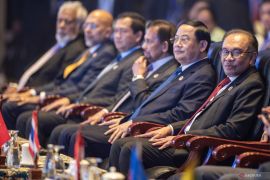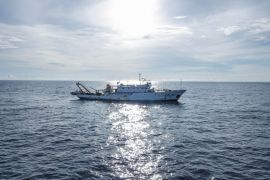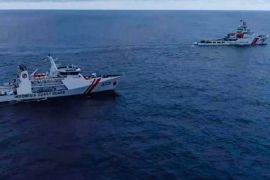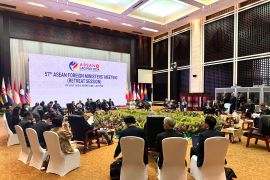China has refused to recognise the ruling by an UN Permanent Court of Arbitration in The Hague that invalidated its vast territorial claims in the South China Sea and did not take part in the proceedings brought by the Philippines.
It has reacted angrily to calls by Western countries and Japan for the decision to be adhered to.
China has repeatedly blamed the United States for stirring up trouble in the South China Sea, a strategic waterway through which more than $5 trillion of trade moves annually.
China, Brunei, Malaysia, the Philippines, Taiwan and Vietnam all have rival claims, of which China's are the largest.
The United States has conducted freedom of navigation patrols close to Chinese-held islands, to Beijing's anger, while China has been bolstering its military presence there.
Speaking behind closed doors at a forum in Beijing on Saturday evening, Sun Jianguo, an admiral and Deputy Chief of the Joint Staff Department of the powerful Central Military Commission, said the freedom of navigation issue was a bogus one that certain countries repeatedly hyped up.
"When has freedom of navigation in the South China Sea ever been affected? It has not, whether in the past or now, and in the future there wont be a problem as long as nobody plays tricks," he said, according to a transcript of his comments seen by Reuters on Monday.
China is the biggest beneficiary of freedom of navigation in the South China Sea and wont let anybody damage it, Sun said.
"But China consistently opposes so-called military freedom of navigation which brings with it a military threat, and which challenges and disrespects the international law of the sea," Sun said.
"This kind of military freedom of navigation is damaging to freedom of navigation in the South China Sea, and it could even play out in a disastrous way," he added, without elaborating.
He said the court case at the Hague must be used by Chinas armed forces to improve its capabilities "so that when push comes to shove, the military can play a decisive role in the last moment to defend our national sovereignty and interests".
Separately, China's Maritime Safety Administration said on Monday that an area just offshore from the east of the island province of Hainan would a no-sail zone from July 19-21 while military drills take place.
China generally describes its exercises in the South China Sea as routine.
Editor: Ade P Marboen
Copyright © ANTARA 2016











